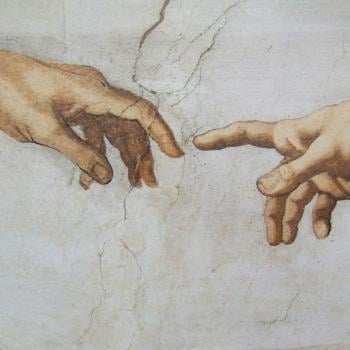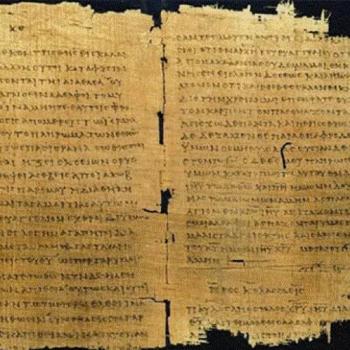I would rather identify with the tax collector, not, of course, because he is hated by his community due to his exploitative profession, but because God liked his prayer better.
William Muehl, Emeritus Professor at Yale Divinity School, once preached a sermon on this parable entitled, "The Cult of the Publican." He points out that the tax collector looks good because he is in a two-person lineup and the other person is one of our stock villains. Says Muehl,
Nathaniel Hawthorne in his novel The Marble Faun has one of his characters complain about a piece of statuary that catches the human figure in a transitional posture. The living form, he objects, should never be frozen by the artist in such a halfway position that one viewing it for the second or third time longs to cry out, "Well, get on with it. Throw it or drop it. Stand or fall. Live or die. But don't just hang there in between!" (William Muehl, "The Cult of the Publican," All the Damn Angels, Philadelphia: Pilgrim Press, 1972, 25-31)
Muehl points out that the stance of self-deprecating penitence is not to become our permanent spiritual posture. Writing in the early 1970s, he expressed his fear that preaching was dominated by a "gospel of guilt." He makes a good point. If this prayer was the only one the publican ever recited for the rest of his life, if the sense of unworthiness invaded and dominated all his thoughts and self-perception for the rest of his life, then he is the last person with whom we would want to identify. There comes a time when we need to trust that we are forgiven and accept divine grace to move beyond regret, remorse, and acknowledgment of our sins into the arena of sanctification, being blessed to be a blessing to others. We certainly can't do that if we are arrogant like the Pharisee. But, as Muehl helpfully points out, neither can we do it if we remain habitually mired in a sense of our unworthiness.
He cites evangelist Billy Sunday (1862-1935), who was no stranger to prayers of unworthiness and dramatic experiences of forgiveness. Sunday is reported to have said once that the best thing that could happen to any person would be to accept Jesus Christ as his personal Savior, walk out of the tent, be hit by a truck, and killed instantly. There would be no test-driving of one's faith, no opportunity to backslide, and no chance to move from "God be merciful to me a sinner!" to "By the Grace of God, I am what I am, and his grace toward me has not been in vain. On the contrary, I worked harder than any of them -- though it was not I, but the grace of God that is with me" (1 Cor. 15:10).
Those who felt unworthy may not have been the original audience of this parable, but it does have a message, not only for the puffed up, but also for any of us today who have become comfortable in our low self-esteem and use it as an excuse for inaction.
True humility contributes to the dynamic of faith allowing the power of God to work through us. Nothing can be allowed to interfere with genuine humility. Not the arrogance that assumes that we are to be placed above others. Not the self-loathing that presumes to denigrate a human being, in this case, ourselves, who is made in the image of God. This parable is a freeze frame, a slice of life. Sooner or later the preacher closes the Bible, says, "Here ends the lesson," and the listeners go out into the world to love and serve our neighbors, divested of both arrogance and shame.
Luke believed the purpose of this parable was to challenge self-righteousness and to promote humility. The lead-in to the parables speaks volumes, "He told this parable to some who trusted in themselves that they were righteous and regarded others with contempt" (18:9). For any who are prone to the dangers of pride and self-righteousness, the parable calls us to look over in the corner to where our teacher stands with bent head. For the tax collector becomes the teacher of the Pharisee in the parable. The invitation to enter into the kingdom of God shows up where we least expect it. It shows up in our inward lives, in the ember of humility that still burns, yet that needs to be fanned to warm and illumine our inner life. In our families, our churches, our communities, the gate to the kingdom of God opens before us in the example of those who are humble before God.
Alyce M. McKenzie is Professor of Homiletics at Perkins School of Theology, Southern Methodist University, Dallas, Texas. Visit her Expert Site at Patheos.





